 W
WBarbara Antonie Barth (1871-1956), also known as Baroness Antonie von Bartolf, was a German actress and the second wife of Duke Ludwig Wilhelm in Bavaria.
 W
WChrista Ingeborg Prinzessin von Thurn und Taxis is the current president of the Bavarian Red Cross (BRK) and a member of the Princely House of Thurn and Taxis by marriage.
 W
WBaroness Armgard von Cramm was the mother of Prince Bernhard of Lippe-Biesterfeld, Prince consort of Queen Juliana of the Netherlands.
 W
WElizabeth, Princess Berkeley, sometimes unofficially styled Margravine of Brandenburg-Ansbach, previously Elizabeth Craven, Baroness Craven, of Hamstead Marshall, was an author and playwright, perhaps best known for her travelogues. She was the third child of the 4th Earl of Berkeley, and was born in Mayfair in the West End of London.
 W
WLuise von Degenfeld was the morganatic second wife of Charles I Louis, Elector Palatine.
 W
WCountess Sophie Friederike Juliane von Dönhoff was a German lady-in-waiting and a morganatic spouse by bigamy to King Frederick William II of Prussia.
 W
WPrincess Edward of Saxe-Weimar was a British aristocrat whose marriage to Prince Edward of Saxe-Weimar made her a kinswoman of the British Royal Family and a member of the royal court.
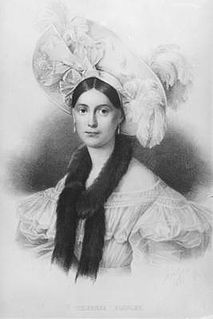 W
WTherese Elssler was a dancer.
 W
WAnna Louise Föhse, Princess of the Holy Roman Empire was a German imperial princess. Born as a commoner to Rudolf Föhse, the court pharmacist in Dessau, and his wife, Agnes Ohme, she married Leopold I, Prince of Anhalt-Dessau and was later ennobled by Leopold I, Holy Roman Emperor.
 W
WEllen Franz was a German pianist and actress.
 W
WConstanze Therese Adelaide Geiger, Freifrau von Ruttenstein was an Austrian pianist, actor, theatrical actress, composer and singer.
 W
WGisela Agnes of Rath was Duchess of Anhalt-Köthen by marriage from 1692. In 1694, she was created Countess of Nienburg. From 1704 to 1715, she was regent of Anhalt-Köthen for her underage son.
 W
WChristine Wilhelmine Friederike von Grävenitz was a German noblewoman who was the royal mistress to Eberhard Louis, Duke of Württemberg, between 1706 and 1731. The couple married in 1707, despite the fact that Eberhard thereby committed bigamy, being already married. From 1710, the couple lived in Ludwigsburg, while the wife of Eberhard Louis lived in Stuttgart. Grävenitz was politically active and was from 1717 until 1731 a full member of the secret government cabinet, which ruled the state. In 1731 the relationship was ended by Eberhard, and the year after, Grävenitz was given a pension and left Württemberg.
 W
WGertrude von Hanau (1803-1882), was a German noble. She was the morganatic spouse of Frederick William, Elector of Hesse.
 W
WCountess Auguste von Harrach, was the second spouse of King Frederick William III of Prussia. At the time of their marriage, the Harrach family was still not recognized as equal for dynastic purposes. Later, in 1841, they were officially recognized as a mediatized family, with the style of Illustrious Highness, which allowed them to have equal status for marriage purposes to those reigning and royal families. Thus, in 1824 when the marriage occurred, it was treated as morganatic, so she was not named Queen, but was given the title Princess von Liegnitz and Countess von Hohenzollern. Frederick reportedly stated that he did not wish to have another queen after Queen Louise.
 W
WCountess Franziska Theresia von Hohenheim was a German noblewoman. From birth she was a Baroness von Bernerdin and from 1765 onwards Baroness Leutrum von Ertingen. She was the official mistress of Charles Eugene, Duke of Württemberg from 1772 to 1785, when she became his second wife. The marriage was morganatic until 1790, when she was allowed use of the dynastic title "Duchess of Württemberg".
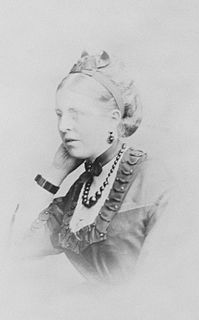 W
WPrincess Victor of Hohenlohe-Langenburg was a British-born aristocrat whose marriage to a German prince naturalised in England made her a kinswoman of the British Royal Family and a member of the royal court.
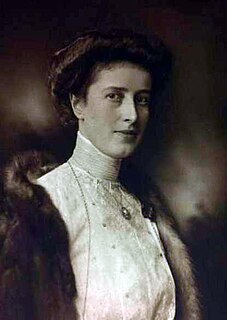 W
WPrincess Oskar of Prussia, Countess of Ruppin was a German aristocrat and the wife of Prince Oskar of Prussia.
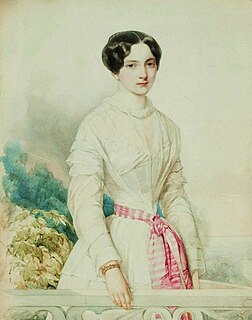 W
WJulia, Princess of Battenberg was the wife of Prince Alexander of Hesse and by Rhine, the third son of Louis II, Grand Duke of Hesse. The daughter of a Polish general of German descent, she was not of princely origin. She became a lady-in-waiting to Marie of Hesse, wife of the future Tsar Alexander II and a sister of Prince Alexander of Hesse and by Rhine, whom she married, having met him in the course of her duties. The marriage of social unequals was deemed morganatic, but the Duke of Hesse gave her her own title of nobility as Princess of Battenberg. She was the mother of Alexander, Prince of Bulgaria, and is an ancestor of Charles, Prince of Wales, heir to the British throne, and to the current generations of the Spanish royal family.
 W
WCountess Claudine Rhédey von Kis-Rhéde was the Hungarian wife of Duke Alexander of Württemberg. Her son, Francis, Duke of Teck, was the father of Mary of Teck, queen consort to George V of the United Kingdom. The current British monarch, Elizabeth II, is Claudine's great-great-granddaughter.
 W
WFranciszka Krasińska, was a Polish noblewoman and wife of Charles of Saxony, Duke of Courland, the son of King Augustus III of Poland.
 W
WLouise Caroline von Hochberg, born Geyer von Geyersberg, from 1787 Baroness von Hochberg, from 1796 Countess of Hochberg was the morganatic second wife of the Margrave and later Grand Duke Charles Frederick of Baden. Her descendants eventually ascended the grand ducal throne and reigned until 1918.
 W
WHenriette Mendel, Baroness von Wallersee was a German actress, and the mistress and, later, morganatic wife of Ludwig Wilhelm, Duke in Bavaria. By him she was the mother of Countess Marie Larisch von Moennich.
 W
WRosine Elisabeth Menthe, was married morganatically with Duke Rudolph Augustus of Brunswick-Wolfenbüttel (1627–1704), Duke of Brunswick-Lüneburg and Prince of Brunswick-Wolfenbüttel.
 W
WCountess Emilie of Reichenbach-Lessonitz née Ortlöpp was the mistress and later second wife of Elector William II of Hesse.
 W
WGertrud von Plettenberg, was administrator of several castles of the Electorate of Cologne and royal mistress of Ernest of Bavaria, Prince-Elector-Archbishop of Cologne. The couple may have married morganatically in secret around 1605.
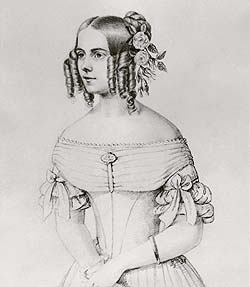 W
WRosalie von Rauch, was a German noblewoman and, since 1853, Countess of Hohenau.
 W
WMargarethe von der Saale, was a German lady in waiting and noble, morganatic spouse by bigamy to Philip I, Landgrave of Hesse.
 W
WMaria Chiara Spinucci (1741–1792), was an Italian aristocrat, courtier of Duchess Maria Antonia of Bavaria and the morganatic spouse of Prince Francis Xavier of Saxony.
 W
WElisabeth Strickrodt, Countess of Askanien, formerly Elisabeth, Duchess of Anhalt, was a German actress and the first wife of Joachim Ernst, Duke of Anhalt.
 W
WJulie Amalie Elisabeth von Voss was a German lady-in-waiting and a bigamous morganatic spouse of King Frederick William II of Prussia.
 W
WCountess Mary von Waldersee, born Mary Esther Lee, was an American-born philanthropist in Germany. She was married in turn to Prince Frederick of Schleswig-Holstein-Sonderburg-Augustenburg and to Count Alfred von Waldersee, the successor of Field-Marshal von Moltke.
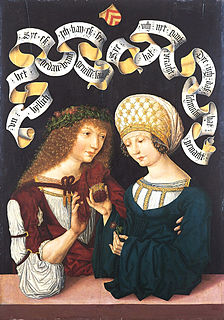 W
WMargarete Weißkirchner (1460-1500), was the common-law-spouse of Philip I, Count of Hanau-Münzenberg from 1477 until their death in 1500. They openly lived together after the death of Philip's spouse in 1477. They could not marry, because she was a commoner. Margaret was not considered Philip's royal mistress, but was treated as if though they were married.